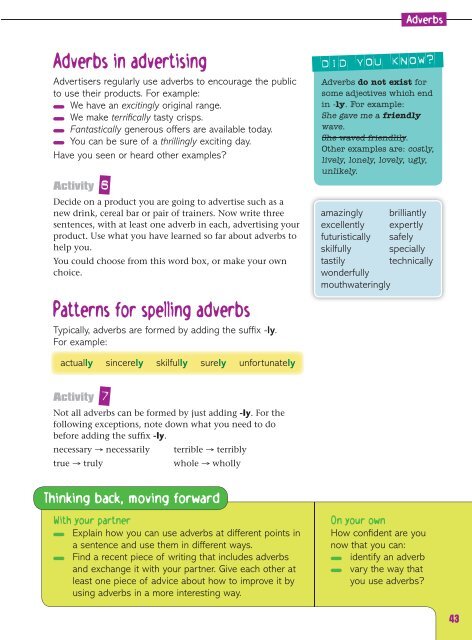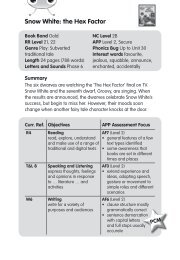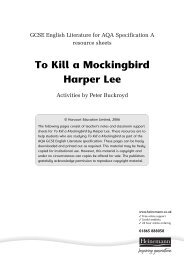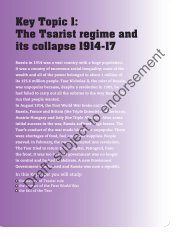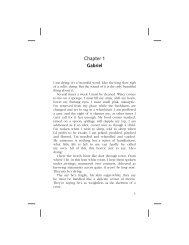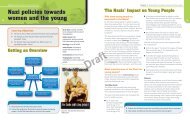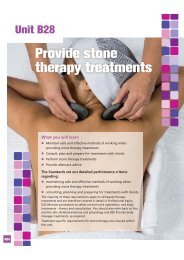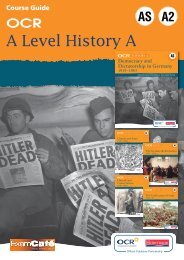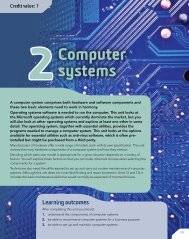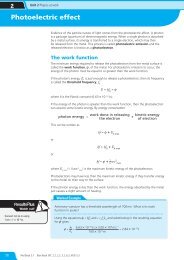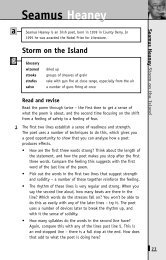Section 1: Words and Phrases - Adverbs (pages ... - Pearson Schools
Section 1: Words and Phrases - Adverbs (pages ... - Pearson Schools
Section 1: Words and Phrases - Adverbs (pages ... - Pearson Schools
Create successful ePaper yourself
Turn your PDF publications into a flip-book with our unique Google optimized e-Paper software.
<strong>Adverbs</strong><br />
<strong>Adverbs</strong> in advertising<br />
Advertisers regularly use adverbs to encourage the public<br />
to use their products. For example:<br />
We have an excitingly original range.<br />
We make terrifi cally tasty crisps.<br />
Fantastically generous offers are available today.<br />
You can be sure of a thrillingly exciting day.<br />
Have you seen or heard other examples?<br />
Activity 6<br />
Decide on a product you are going to advertise such as a<br />
new drink, cereal bar or pair of trainers. Now write three<br />
sentences, with at least one adverb in each, advertising your<br />
product. Use what you have learned so far about adverbs to<br />
help you.<br />
You could choose from this word box, or make your own<br />
choice.<br />
Patterns for spelling adverbs<br />
Typically, adverbs are formed by adding the suffi x -ly.<br />
For example:<br />
actually sincerely skilfully surely unfortunately<br />
Did you know?<br />
<strong>Adverbs</strong> do not exist for<br />
some adjectives which end<br />
in -ly. For example:<br />
She gave me a friendly<br />
wave.<br />
She waved friendlily.<br />
Other examples are: costly,<br />
lively, lonely, lovely, ugly,<br />
unlikely.<br />
amazingly brilliantly<br />
excellently expertly<br />
futuristically safely<br />
skilfully specially<br />
tastily technically<br />
wonderfully<br />
mouthwateringly<br />
Activity 7<br />
Not all adverbs can be formed by just adding -ly. For the<br />
following exceptions, note down what you need to do<br />
before adding the suffix -ly.<br />
necessary → necessarily terrible → terribly<br />
true → truly<br />
whole → wholly<br />
Thinking back, moving forward<br />
With your partner<br />
Explain how you can use adverbs at different points in<br />
a sentence <strong>and</strong> use them in different ways.<br />
Find a recent piece of writing that includes adverbs<br />
<strong>and</strong> exchange it with your partner. Give each other at<br />
least one piece of advice about how to improve it by<br />
using adverbs in a more interesting way.<br />
On your own<br />
How confi dent are you<br />
now that you can:<br />
identify an adverb<br />
vary the way that<br />
you use adverbs?<br />
43


